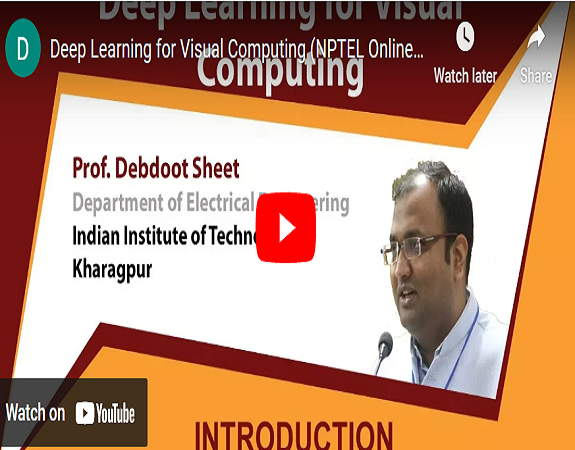What you will learn
-
Introducing research in education to engineering teachers.
Deep learning is a genre of machine learning algorithms that attempt to solve tasks by learning abstraction in data following a stratified description paradigm using non-Âlinear transformation architectures. When put in simple terms, say you want to make the machine recognize Mr. X standing in front of Mt. E on an image this task is a stratified or hierarchical recognition task. At the base of the recognition pyramid would be features which can discriminate flats, lines, curves, sharp angles, color higher up will be kernels which use this information to discriminate body parts, trees, natural scenery, clouds, etc. higher up it will use this knowledge to recognize humans, animals, mountains, etc. and higher up it will learn to recognize Mr. X and Mt. E and finally the apex lexical synthesizer module would say that Mr. X is standing in front of Mt. E. Deep learning is all about how you make machines synthesize this hierarchical logic and also learn these representative features and kernels all by itself. It has been used to solve problems like handwritten character recognition, object and product recognition and localization, image captioning, generating synthetic images to self driving cars. This course would provide you insights to theory and coding practice of deep learning for visual computing through curated exercises with Python and PyTorch on current developments.



















































No Discussion Found
0.0
0 Reviews
Meet Your Instructor
About Instructor
Prof. Debdoot Sheeet is an Assistant Professor of Electrical Engineering at the Indian Institute of Technology Kharagpur and founder of SkinCurate Research. He received the MS and PhD degrees in computational medical imaging and machine learning from the Indian Institute of Technology Kharagpur in 2010 and 2014 respectively. He was a DAAD visiting PhD scholar to TU Munich during 2011--12. His research interests include deep learning and domain adaptation, computational medical imaging, image and multidimensional signal processing, surgical analytics and informatics, visualization and augmented reality technology design. He has widely published in journals including Medical Image Analysis (MedIA), and conferences like the IEEE International Symposium on Biomedical Imaging (ISBI). He is a member of IEEE, SPIE, ACM, IUPRAI and BMESI and serves as an Editor of IEEE Pulse since 2014.

Free
-
Course Duration26 h 7 m 23 s
-
Course LevelIntermediate
-
Student Enrolled0
-
LanguageEnglish
This Course Includes
- 26 h 7 m 23 s Video Lectures
- 0 Quizzes
- 0 Assignments
- 0 Downloadable Resources
- Full Lifetime Access
- Certificate of Completion
